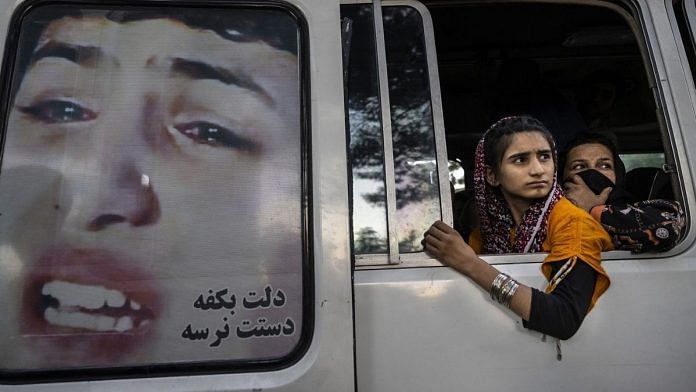As the Taliban entered the Afghan capital of Kabul on Sunday, university lecturers gathered their female students for some final goodbyes. Telling the shocked young women “we may not meet again,” the lecturers, along with everyone else, were evacuated, and the universities, along with schools, offices and shops, were shuttered.
I spoke by phone with Aisha Khurram, one of those students whose academic dreams have been cut short. There are thousands more like her. The 22-year-old is in the final semester of her international relations degree at Kabul University. With just two months left, she says, “now it seems I will never graduate.” Her monograph was on United Nations Security Council reforms and how they’ll affect special missions in countries like Afghanistan. Just one more thing the world will be deprived of now the Taliban are back in power.
In Herat, the country’s third largest city, which fell to the Taliban on Thursday, girls who showed up at their universities were turned away, Khurram says. “The education system is collapsing.”
There is, however, one business that is booming. In the provinces, burqa shops are reopening and the thick, blue garments that cover a woman’s body from head to toe — the repressive symbol of the Taliban’s previous rule — are becoming an expensive, must-have item. Though not for everyone.
“I am seeing a lot of women who did not experience the previous Taliban period who are saying ‘we will not adopt this oppressive dress,’ ” says Khurram, who was the Afghan Youth Representative to the United Nations in 2019. “I do not know what will happen to the younger generation of Afghan women. They were coding. They were so brilliant. Now they are all sitting at home wondering what will happen. This generation formed the modern Afghanistan.”
There’s a meeting of Taliban and Afghan government leaders in Doha on Monday, where negotiations are expected to take place for a peaceful transfer of power. All the citizens of Afghanistan can do is wait and worry. There were reports Sunday of dozens of helicopter flights over Kabul as the U.S. and other nations rushed to evacuate their citizens, leaving Afghans to their fate.
So this is where we are: The Taliban now hold most of the country, from the provinces to the regional capitals, the border crossings with most of the six neighboring countries and now, the capital, well before the full withdrawal of U.S. troops on Aug. 31. It has instructed its fighters to stay at the gates of Kabul until talks have concluded.
But that is cold comfort for Afghans, including the thousands of displaced people who’ve poured into the capital to escape the group’s draconian rule, as reports filter in of ugly reprisal killings, women ordered from their workplaces and into their homes, men told to grow beards and girls forbidden from attending school. In the tried and true playbook of militia all over the world, young men are pressured to join their ranks, their dreams of a better future evaporating with those of their sisters. We are straight back to the 1990s.
‘Done being victims’
Despite the very real risk, many Afghans are continuing to speak out, with some, like Muska Dastageer, a lecturer at the Kabul-based American University of Afghanistan, directly engaging with Taliban spokesmen on Twitter. “Afghans are done being victims. Afghan women will not hide. We will not be afraid,” Dastageer tweeted to Suhail Shaheen, a member of the group’s negotiating committee. “The glare of the whole world is on Afghanistan, on Kabul, on Taliban and what they do.”
It’s hard to avoid the word betrayal. From the moment former President Donald Trump approved the deal between the U.S. and the Taliban — signed on Feb. 29 last year — that excluded the elected Afghan government, the writing was on the wall. It called for an initial drawdown of U.S. troops and the release of 5,000 Taliban prisoners. In exchange, the Taliban pledged to cut ties with all terrorists, prevent Afghan territories from becoming militant havens and to engage in peace talks that were meant to lead to a ceasefire and an end to decades of war.
They got the troop withdrawal, and many of those prisoners who were released have since taken up arms and helped the group seize power across the country. What’s missing? Any sign the Taliban will fulfill their end of the bargain. That the U.S. and its global cheerleaders allowed this to happen will dent Washington’s diplomatic stature for years to come.
President Ashraf Ghani, whose government — mired in allegations of corruption and incompetence — failed to either anticipate the Taliban’s rapid advance or unite the country’s powerful warlords behind the Afghan National Army, reportedly left the country Sunday with a coterie of aides.
For now, people are in shock, Khurram says. There are no tears — no one understands what to feel any more. Traffic choked the capital, as panicked residents raced to reach the safety of home. The electricity has been out since Sunday morning, so it’s only those with power who can watch TV news and monitor Twitter for any signs of what the Taliban might do next. “People want to leave but the borders are closed.”—Bloomberg
Also read: 400,000 people displaced as Taliban advances in Afghanistan fuel humanitarian crisis



